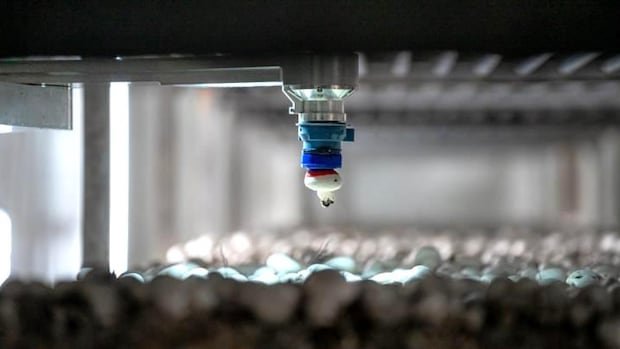A British Columbia (B.C.) startup specializing in AI-powered mushroom harvesting robots has secured a $40 million investment to further advance its autonomous agricultural technology. The company, 4AG Robotics, situated in Salmon Arm, near Vancouver and Calgary, manufactures robots equipped with AI-driven cameras and suction cups to efficiently harvest, trim, and pack button mushrooms on commercial farms.
Currently, sixteen of these autonomous robots are operational round the clock across various locations in Canada, the U.S., Ireland, the Netherlands, and Australia. With the recent infusion of $40 million in venture capital, 4AG Robotics aims to expand its robot fleet to a hundred units within the next year.
The surge in AI agricultural technology globally is addressing challenges such as labor shortages in the food production sector. In Canada, the Canadian Agricultural Human Resource Council highlights the significant unfilled agricultural job vacancies annually, a trend expected to worsen. This shortage is particularly evident in mushroom cultivation, where workers labor continuously in demanding indoor environments due to the rapid growth of fungi.
4AG Robotics foresees the mushroom market demand exceeding $70 billion by 2030, outstripping the available human labor force. The company anticipates its robots will bridge this gap while reducing mushroom farm production costs, which currently account for half of total expenses.
Despite the automation of labor-intensive tasks by robots, 4AG plans to employ more staff for robot production, programming, maintenance, and sales. This strategic shift will allow human workers to transition to other roles within the company.
Experts like Sean Smukler, Director of the Centre for Sustainable Food Systems at the University of British Columbia, emphasize the importance of mindful AI utilization in agriculture. AI technologies, including precision agriculture and targeted weeding, aim to enhance efficiency, reduce environmental impact, and improve farmers’ profitability amid evolving consumer demands, rising costs, labor shortages, and climate change.
Smukler cautions that while AI advancements offer benefits like cost reduction and sustainability, careful consideration must be given to the ethical and societal implications of widespread adoption. He advocates for a balanced approach that leverages AI to enhance farming practices without diminishing the essential role of human farmers in society.

